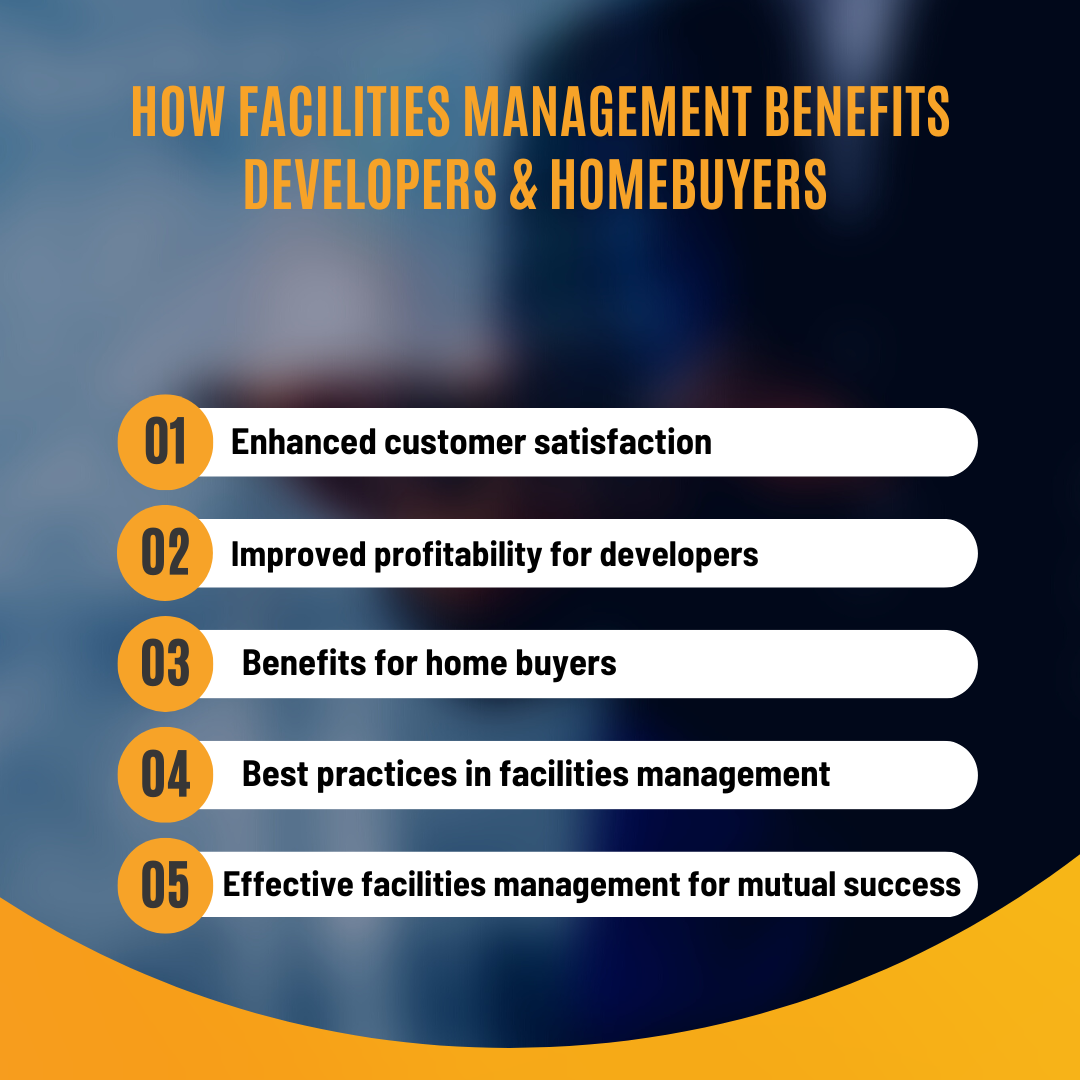1. Introduction
Facility management is a critical aspect of ensuring the smooth and efficient operation of residential buildings. From maintenance and repair to cleanliness and convenience, facility management services play a crucial role in optimizing the operations of these spaces. In cities like Mumbai and Bangalore, where the demand for residential buildings is high, the need for reliable facility management companies is paramount. Integrated facility management services are a comprehensive solution that encompasses all aspects of managing residential buildings, offering a one-stop solution for property owners. In this article, we will discuss the key to successful facility management and delve into the top facility management companies in India that provide integrated facility management services. Whether you are a property owner or a facility management professional, this article will provide valuable insights into optimizing residential building operations.
2. Understanding the role of facility management in residential buildings
In order to fully grasp the key to successful facility management, it is important to understand the vital role it plays in residential buildings. Facility management goes beyond simple maintenance and repair tasks; it involves a comprehensive approach to optimizing the operations of these spaces.
One of the primary responsibilities of facility management in residential buildings is the upkeep of the physical infrastructure. This includes everything from regular maintenance and repairs to ensuring the safety and security of the residents and their belongings. Additionally, facility management professionals are responsible for managing and coordinating various services such as housekeeping, waste management, landscaping, and pest control.
By efficiently managing these aspects, facility management companies help in creating a comfortable and functional living environment for the residents. They play a crucial role in enhancing the overall experience and ensuring the smooth operation of residential buildings.
3. Importance of optimizing building operations
Optimizing building operations is essential for successful facility management in residential buildings. By focusing on this aspect, facility management professionals are able to ensure that the building operates efficiently, minimizing costs and maximizing performance.
Efficient building operations start with effective energy management. By implementing energy-saving measures such as LED lighting, smart thermostats, and energy-efficient appliances, facility managers can significantly reduce energy consumption and lower utility costs for both the building and its residents.
Another key aspect of optimizing building operations is implementing effective waste management strategies. By properly separating and disposing of recyclables, as well as implementing composting programs, facility managers can contribute to a more sustainable living environment and reduce landfill waste.
Furthermore, optimizing building operations also involves proactive maintenance planning. By conducting regular inspections and addressing issues promptly, facility managers can prevent major breakdowns and costly repairs.

4. Strategies for optimizing residential building operations
Now that we understand the importance of optimizing building operations in facility management, let’s explore some strategies that facility managers can adopt to achieve success in this area.
One effective strategy is to invest in technology that allows for remote monitoring of building systems. By using building management systems and sensors, facility managers can gather real-time data on energy consumption, equipment performance, and occupancy levels. This data can then be analyzed to identify areas for improvement and make informed decisions on optimizing energy usage and improving overall efficiency.
Another strategy is to prioritize preventive maintenance. By implementing a proactive maintenance plan, facility managers can identify and address potential issues before they turn into major problems. Regular inspections, equipment servicing, and timely repairs not only prevent costly breakdowns but also extend the lifespan of building assets.
Additionally, facility managers can engage residents in these optimization efforts. By providing educational material and conducting workshops on energy saving habits and waste management practices, residents can actively contribute to the efficiency and sustainability goals of the building.
In conclusion, optimizing residential building operations requires a combination of technology, proactive maintenance, and resident engagement. Facility managers who prioritize these strategies will not only improve the performance of their buildings but also enhance the living experience for residents.
5. Implementing technology for efficient facility management
In today’s fast-paced world, technology plays a crucial role in optimizing facility management. Implementing technological solutions can streamline operations, enhance efficiency, and improve the overall performance of residential buildings. Let’s explore some key technologies that facility managers can leverage to achieve success in this area.
One technology that is gaining popularity is the use of smart building automation systems. These systems allow facility managers to monitor and control various building systems, such as HVAC, lighting, security, and more, from a centralized platform. By integrating these systems, facility managers can automate processes, optimize energy usage, and respond to issues in real-time, resulting in cost savings and improved comfort for residents.
Another useful technology is the Internet of Things (IoT). IoT devices, such as sensors and smart meters, can be deployed throughout the building to collect data on various parameters, including temperature, humidity, occupancy, and energy consumption. This data can then be analyzed to gain insights and make data-driven decisions on optimizing building operations.
Cloud-based facility management software is also gaining popularity among facility managers. These software solutions enable seamless communication and collaboration among different stakeholders, such as facility managers, maintenance teams, and residents. They provide a centralized platform for managing work orders, tracking assets, scheduling preventive maintenance, and accessing real-time data and reports.
In addition to these technologies, facility managers can consider implementing mobile apps for residents. These apps can provide residents with access to important information, such as maintenance requests, building notices, and energy consumption data. They can also serve as a platform for resident feedback and engagement, fostering a sense of community and collaboration.
By embracing technology, facility managers can optimize residential building operations, improve efficiency, and enhance the overall living experience for residents.
6. The role of effective communication in facility management
Effective communication is crucial in facility management to ensure smooth operations and the satisfaction of residents. Facility managers must establish clear lines of communication with various stakeholders, including maintenance teams, contractors, residents, and management.
By maintaining open and transparent communication, facility managers can address issues promptly, keep stakeholders informed about maintenance schedules and repairs, and gather feedback on building operations and services. This information is invaluable for making informed decisions and continuously improving facility management practices.
Technology can play a significant role in facilitating effective communication. Cloud-based software solutions mentioned earlier enable seamless communication and collaboration, providing a centralized platform for stakeholders to exchange information, report issues, and track the progress of maintenance requests. Mobile apps for residents also serve as a communication channel, allowing residents to report concerns and receive updates on maintenance activities.
7. Ensuring sustainability in residential building operations
In addition to effective communication, sustainability is another key factor in successful facility management. As environmental concerns continue to rise, it’s important for facility managers to prioritize sustainability in their residential building operations.
One way to achieve sustainability is by implementing energy-efficient measures. This includes using energy-saving appliances, installing LED lighting systems, and implementing smart building technologies that can optimize energy usage. Facility managers should also prioritize waste management and recycling programs to reduce the environmental impact of the building.
Another aspect of sustainability in residential building operations is promoting green practices among residents. Facility managers can educate residents on the importance of energy conservation, recycling, and sustainable living. Implementing community-wide initiatives, such as organizing recycling drives or encouraging the use of public transportation, can also contribute to a more sustainable living environment.
By incorporating sustainability into their facility management practices, facility managers can not only reduce costs but also contribute to a greener and more environmentally-friendly residential building.
8. Conclusion: Achieving success through optimized facility management
In conclusion, optimizing residential building operations is crucial for successful facility management. Effective communication and sustainability are two key elements that facility managers should focus on. By prioritizing sustainability, facility managers can reduce costs and contribute to a greener environment.
Implementing energy-efficient measures such as using energy-saving appliances and LED lighting can help optimize energy usage in residential buildings. Waste management and recycling programs should also be prioritized to reduce the environmental impact.
Promoting green practices among residents is another important aspect. Educating residents on energy conservation and sustainable living can make a significant difference. Community-wide initiatives like recycling drives and encouraging the use of public transportation can further contribute to a sustainable living environment.
By incorporating these strategies into their facility management practices, facility managers can achieve success in residential building operations.
SILA adopts a tech-driven approach, utilizing Robotics and IoT, Automated Compliance Management, and our proprietary technology (SILA Connect) to efficiently manage properties across India. As pioneers in technology within the facility management sector, SILA stands out as one of the best facility management service provider in India.
To delve deeper into our integrated facility management services, click here.
Industries We serve –
Commercial Offices & Buildings | Manufacturing & Heavy Industrial Facilities | Residential Complexes & Townships | Hotels & Campuses | Airports & Malls | IT Parks & Data Centres | Warehousing & Logistics Parks | Banks & Retail
Present in 125 cities –
Ahmedabad | Baroda | Bengaluru | Chennai | Bhubaneswar | Delhi | Gurugram | Noida | Kolkata | Hyderabad | Kochi | Mumbai | Pune & more
Get a free quote today, to reduce your facility cost.
FAQs -
1. What are the benefits of outsourcing Facility Management services?
Outsourcing FM services can provide specialized expertise, cost-effectiveness, access to advanced technology, scalability, and the ability to focus on core business activities while experts manage facility operations.
2. How do you measure the success of Facility Management?
Key performance indicators (KPIs) such as uptime of critical equipment, energy efficiency, maintenance costs, safety records, compliance levels, and overall productivity are often used to measure the success of FM practices.
3. How does Facility Management play a key role in an organization's success?
Facility Management (FM) plays a pivotal role in an organization’s success by contributing to various aspects that directly impact efficiency, productivity, and overall performance. FM ensures that the physical workspace, infrastructure, and systems are well-maintained, safe, and conducive to work. A properly managed facility promotes productivity among employees by providing a comfortable and efficient working environment.
4. How does outsourcing Facility Management lead to cost savings?
Facility Management proves to be cost-effective. Managing spaces in-house can incur significant expenses. However, outsourcing it not only reduces the time your staff spends overseeing facility operations but also results in long-term savings.
About SILA -
SILA – A Real Estate platform driven by an entrepreneurial spirit.
Our businesses include Real Estate Services which offer Facility Management, Contracting Solutions and Real Estate Advisory. Our other business is Real Estate Development. We have a diverse client base in various sectors which include large Corporates, Real Estate Funds, Landowners and Developers.
Over the last decade, SILA has scaled efficiently, managing over 150 million square feet of assets, with over 20,000 employees pan India. The platform is backed by
Norwest Venture Partners and Samara Capital Group in our Real Estate Services and Development arms, respectively.
SILA is one of the best facility management service provider in Mumbai, Bengaluru, Delhi, Chennai, Hyderabad, Pune & more.


